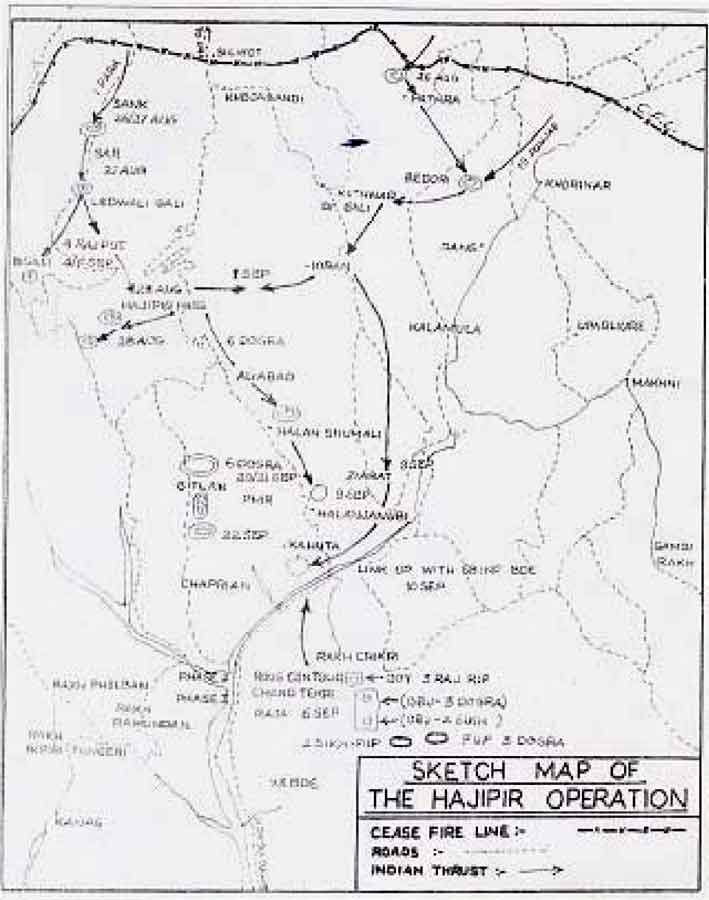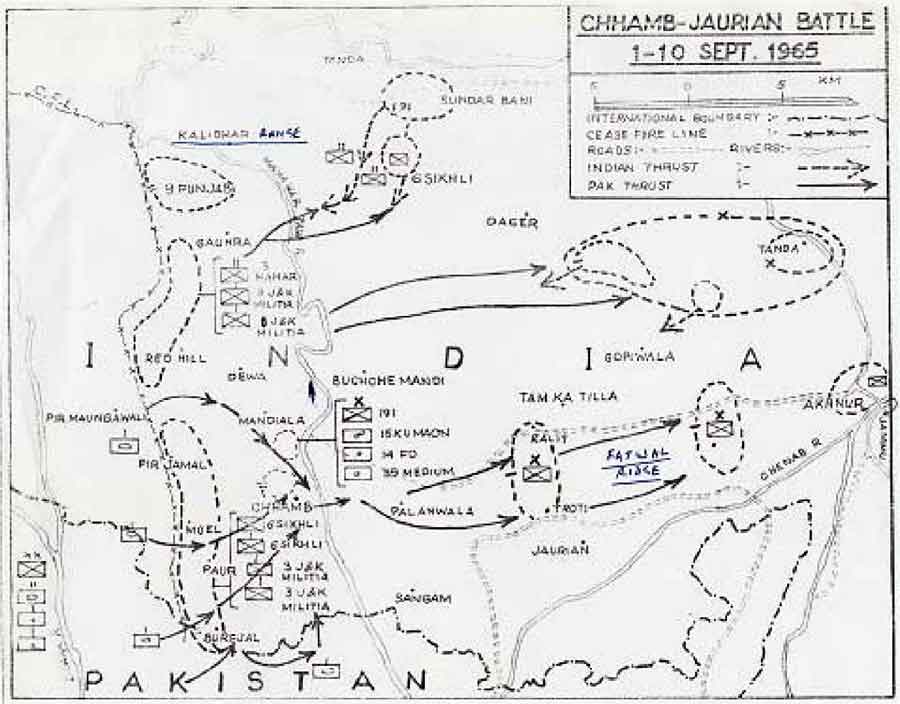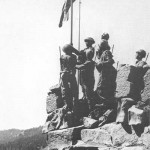In 1965 war, Indian Army had captured the strategic Haji Pir Pass. During the Tashkent talks between Indian and Pakistan, held through the good offices of Soviet Union, India agreed to return Haji Pir Pass, Pt 13620 which dominated Kargil town and many other tactically important areas. To add mystery to the whole process, Prime Minister Shastri died on 10th January, 1966 after signing the Tashkent Declaration with President Ayub Khan of Pakistan. He was denounced by all and sundry for caving in to the Russian pressure and made to return Haji Pir Pass to Pakistan, resulted in two grave disadvantages to us: One- had the pass been held by us, the distance from Jammu to Srinagar through Poonch and Uri would have been reduced by over 200 Kms. Two – later on Pak commenced its infiltration into J & K in 1965, through the Uri – Poonch Bulge which continues even today. They why did we commit this error of judgement?
Haji Pir Operations:
Following failure of Operation Grand Slam, the infiltration attempt in J & K in August, 1965, Pakistan decided to launch its offensive operation in Chhamb in order to capture Akhnoor, thus cutting off lines of communication to Poonch Sector. Subsequently operations were to be progressed to Jammu to cut off the Valley from the rest of the country. Selection of Chhamb – Jauriyan Sector conferred many advantages on Pakistan. The area is bound in the west by the Ceasefir Line, which is the South and Kalidhar Range in the North.
thrust in this area was launched by Pakistan on 1st September, 1965. After crossing Munnawar Tawi which is fordable in winters by tanks, Pakistan forces started moving eastwards and were halted at Fatwal Ridge, only 4 Km. from Akhnoor when Indian offensive in Lahore sector forced Pakistan to thin out Chhamb Sector and thus its momentum was halted.
Chhamb – Jauriyan Battle
When negotiations commenced in January, 1966 between India and Pakistan under the aegis of Soviet Union, India had to view the threat posed by Pak dagger into Indian heart in Chhamb Sector. Since Pakistani forces had already reached Fatwal ridge only four Kms. from Akhnoor, it could always resume operations for capture of Akhnoor. The author understood this implication better in 1987 when he was commanding his unit near Jauriyan, a few kilometers west of Fatwal Ridge. The Indian policy makers at that time did not visualize infiltration threat through Uni-Poonch bulge and hence it was decided to return Haji Pir Pass to Pakistan and ask them to withdraw from Chhamb Sector since it would not have been advisable to let Pakistan point a dagger at Akhnoor and thereafter at Jammu. It was too high a risk to take. So Prime Minister Shastri was left with no option. Whether he died due to a feeling of guilt will remain a mystery. But in hindsight, India was remiss in not capturing Haji Pir Pass in 1971 war. It was the only worthwhile objective on the Western Front. Thus ends the myth and reality of return of Haji Pir Pass by India after 1965 war. May Shahstri’s soul rest in peace.







आज इतने सालो बाद भी एक बात आज तक समझ नहीं आयी कि आख़िरकार सोवियत संघ और शास्त्री जी के बीच क्या बात हुई और भारत ने क्यों जीती हुई जमीन पाकिस्तान को वापस कर दी…? वो भी तब जब कि सोवियत संघ भारत का घनिस्ट मित्र था।
Even after so many years, one thing has not been understood till date, what happened between the Soviet Union and Shastri ji and why did India return the won land to Pakistan…? That too when the Soviet Union was a close friend of India
What I am about to write you might already know.
In the international water, peoples care for their interest . India’s friendly nation has lot of covid-19 vaccine ( at a time when they have opened up their economies) but nothing has come to india in the need of hour whether free or at cost
Why didn’t we capture Haji Peer Pass in 1971, while Pakistan captured Chhamb, which it still retains? Why such a Himalayan blunder?
I feel India is let down by the Indian political leadership.. In fact the Comments by Mr Asif Ali Zardari some time back is and should be an eye opener and he referred that certain part of the lost territory of Pakistan was bought back from the Indian leaders.. So it was a commercial deal
Over the national interest by the then Indian leadership… It is sad… And most disgusting….
An illuminating , clinical and conclusive article based on facts and incisive reasoning. PSE continue sir. Best Rgds A Gunner’s Son
Sir , My Grandfather was posted in chamb jauriyan sector on deputation . During the Pakistani insurgency he was there on duty and is missing since 1st September 1965 .
Sir can you help us in anyway in enquiring about him.
Please contact me 8800882681, gurpreet.saini115@gmail.com
Paaji we been ruled ever dumb or too smart or too selfish or too greedy or just ignorant/careless OR everything of above points. They aren’t even capable to hold on to what we gained (which was ours) after losing precious lives of our soldiers, do you really expect ANY help from them ?
I am sick of our systems.
No doubt it was a blunder on part of India to return Hajipir Pass whatever be the compulsions.Prob India should have agreed to the ceasefire only after driving out Pak army from Chhamb Jaurian sector.
It was not the first time we did, and under able leadership of advocates of peace, we have always been caught on wrong foot of decisions. Shastri and Nehru were great personalities, but leadership and on ability to foresee threats and securities, they were failed miserably and were caught in fool’s dilemma.
Pakistan is currently holding haji pir.
Who is holding Haaji peer pass now, India or Pakistan?
Yes but that was a sleeping enemy with weak strength in 1965 at Haji Pir. You could count them on the fingers of one hand. What was the fate of a similar assault on Haji Pir by much more planned and equipped Indian attack in 1971? The attackers had to withdraw suffering heavy losses. Major Ramesh Baldani was killed along with many soldiers. One sided heroics?
Very Good Article. I suggest that the author should write an article. explaining how to take back the lost territories in Chamb sector?
The 5th columnists LIBSECULARS have always been dominating the politicians and the Babus. That is why India has suffered
Lets look sth good for future….esp after freedom of balochistan
As explained earlier, we were in no position to retain Haji Pir in 1965, after Soviets wanted both the countries to return to pre-1965 positions.
Biggest mistakes of independent India by the then politicians and not resisted by our Service Chiefs – return of Haji Pir pass after 1965 war and return of 93000 PoWs without settling down Kashmir issue once and for all. A regret forever.
It needs an experienced commander to clarify on such matters of importance. We should have more such articles by services commanders to educate the country. excellent work. It will enrich the national debate.
India is always weak at negotiations. It returned strategically important Haji Pir pass in 1965 at Tashkent negotiation and could not settled Kashmir in 1971 in return for release of 93000 POWs.
The problem is military issues can not be viewed in isolation. It becomes problematic, when Generals think they know every thing. It is very good to be analysts in hindsight. Firstly, to correct the myth Haji Pir does not reduce distance between Jammu and Srinagar, it only connects Uri and Poonchh and reduces the distance between them. In 1965, we had no other option, firstly, both sides publicised 1965 as victory (Pakistan celebrates it as Defence day), where as it was a stalemate, consequently, there was adverse reaction to Tashkent in both India and Pakistan. In India it was muted because of Shastri’s death, but in Pakistan, it eventually claimed Ayub’s throne. Internationally, we are totally isolated. Entire western world was arrayed against us. Soviets and the Eastern Block were our only support and in 1965 Soviets were arbitrating. There was no way we could go against them. To compound matters we were facing a severe drought and barely surviving with PL 480. It was practically impossible to go against Soviets in 1965 with US and China already opposed to you and millions avoiding starvation with US aid of 6.7 million tons of surplus wheat (in 1965 alone). No one wants to talk about why India Army did not advance in the Western front in 1971 or we could not recapture Haji Pir in 1971.
With every sell out of the country by the politician and bureaucracy, I seem to be succumbing to the SK group … “SANNU KI”….
Simply business, Russia and other so called super power needs to sell their arms and make their economy rolling..and countries like India are pressurised because we are dependent on so many things and lack of strong leadership are also to be blamed though I have lot of respect for Lal bahadur Shashtri bt it was impossible for one man to deny age long submissive policies
No doubt it was a blunder on part of India to return Hajipir Pass whatever be the compulsions.Prob India should have agreed to the ceasefire only after driving out Pak army from Chhamb Jaurian sector.
I think we had captured some parts of Tharparker (Sind) also. After Tashkent we withdrew from there. Had that part been with us we could have won over local population of Hindu sodha Rajputs. These sodha Rajputs later on helped Indian Army a lot by providing intelligence inputs during 1971 war.
Politicians have no aptitude to understand strategic implications of decisions. They do not involve army into the decision making process.
Kargil gave us the opportunity to take it back..buy Wat happened was the failed IAS along with the politicians thrust their war strategy experience??#$ on to the military whose chiefs meekly accepted it acting like postmen delivering the wrong politbureau strategy along the chain of command
Sir, though I haven’t studied much about the 1965 conflict, but I have this firm belief that had Indian Army prevailed over political leadership to continue a protracted high -low intensity campaign along the LOC from 65-71 as Israel had done in the war of attrition, Pakistan would not have had the wherewithal to sustain such operations & would have resulted in the collapse of POK & more importantly Gilgt-Skardu-Baltistan axis which would have given India a much larger in-depth foothold over Pakistan & central Asia. If that was not possible, lets fast forward to 1971, after a knockout blow in B’desh to Pak, similar sustained High Intensity localized campaigns should have been conducted in Gilgit -Kargil Axis. Pakistan would have given up the contest. Fast-forward to know post such a scenario, domination over NWFP, FATA & proximity to Afghan Central Asia would have meant lesser elbow room for Pakistan northwards from Islamabad. Vulnerable highways such NH1 would have not been vulnerable. From an ethnic mix, a larger Shia population from Gilgit – Baltistan would have created a more heterogeneous demography for J&K giving lesser leverages to extremists. There was enough opportunity in pure military terms even in Kargil when Pakistan’s war -economy was shrinking rapidly& was isolated. There so called FCNA & ARN did not posses sustained war fighting economy
Such posturing would have created directed access to Karakoram & Hindukush ranges & trade routes & would have negated Chinese take over of Karakoram area which was gifted to China by Pak. From Geo-political, socio-ethnic, Geo-economic, Socio-economic, terms it was win-win-win situation. Pakistan would have been on a zero sum game, shrinking even more rapidly after loss of POK/NA as movements in Sindh Baluchistan & FATA would have gathered pace. Pakistan could have probably become just a territory comprising of Rawalpindi, Peshawar, Multan & Khyber. Subservient to India & Greater Afghanistan / Iran
Enough Sa
It has been pointed out in this forum that Shastri had been poised at the Tashkent Agreement.
In the circumstances highlighted by the Major General, armed forces must influence political leaders to listen forces point of view. I think simply obeying political orders from bosses having poor knowledge of such matters is close to unpatriotism..
I do not think that the Indian policy makers did not visualize the threat of infiltration, but the immediate need for withdrawal of the threat to Akhnoor probably outweighed the future possibility of infiltration. The immediate threat was even more menacing given the fact that the Indian Army was still in a state of reorganization after the 1962 border war with China and not in the best possible preparedness against a determined thrust from the enemy.
If india had kept Haji Pir, then war like situation in Srinagar would have shifted to Haji Pir. That would have been Pakistani Army focus to get back. Getting Srinagar would have been in the background.
Please inform the distance between Uri & Poonch via Haji Pir Pass.
Thanks,
Abhay Damle.
Non-sense/non-patriotic comments like ‘dhoti wala’ etc etc irritaes ppl and insults the article…..! Particularly from ‘Sings’…. itz like the ‘Singh’ who is holding the PM chair now promtly/bravely beating back the bold and boss like un-opposed Chinese army cat-walk & jolly camp into our territory, pakistan border firing.. even Burma army incusrion into our territory..!
Thanks for your information
Sir, with all due respect, that ‘dhotiwala’ had enough guts and understanding to heed military advise and open Lahore front. When no one, not even Pakistanis, expected India to do so. Secondly, what would have been more dangerous situation – Indian ability to launch offensive through Haji Pir or PA ARN sitting on Indian jugular in Akhnoor? Regards,
In his book distant Neighbours Kuldip Nayar who was part of the PM’s entourage to Tashkent claims that Shastri was under great Soviet pressure over return of captured territories to Pak. When he continued to resist he was blackmailed into accepting it when the Soviet Union expressed its inability to continue with its support on the Kashmir issue with its power of veto at the UN. This was the risk that Shastri could not take. He had to choose between the devil and the deep sea as far as Indian interests were concerned. This could have caused the cardiac arrest of which he is believed to have died.
Another Screw up by dhotiwalas as usual. Long line of dhotiwala will always screw this nation.
Mr . please dont talk so lightly about Mr.Shastri .he was a great soul ….. no one in the politics can stand up to his standard not only in india but of whole world
if the Tashkent talks brokered by Russia , would have failed , even russia would have distanced us and India would have been isolated in the International community then back in 1966 , america was already against us and we wouldnt have afforded russia to get close to pakistan , and thought of loosing support of russia in the UN security council , it had the defence deals of MiG planes and middle tanker ,which would affects these defence deals….. then back India was facing serious drought and the grain in the stock was nil and america had refused to help it was only obvious to accept the deal in interest of the people of India.